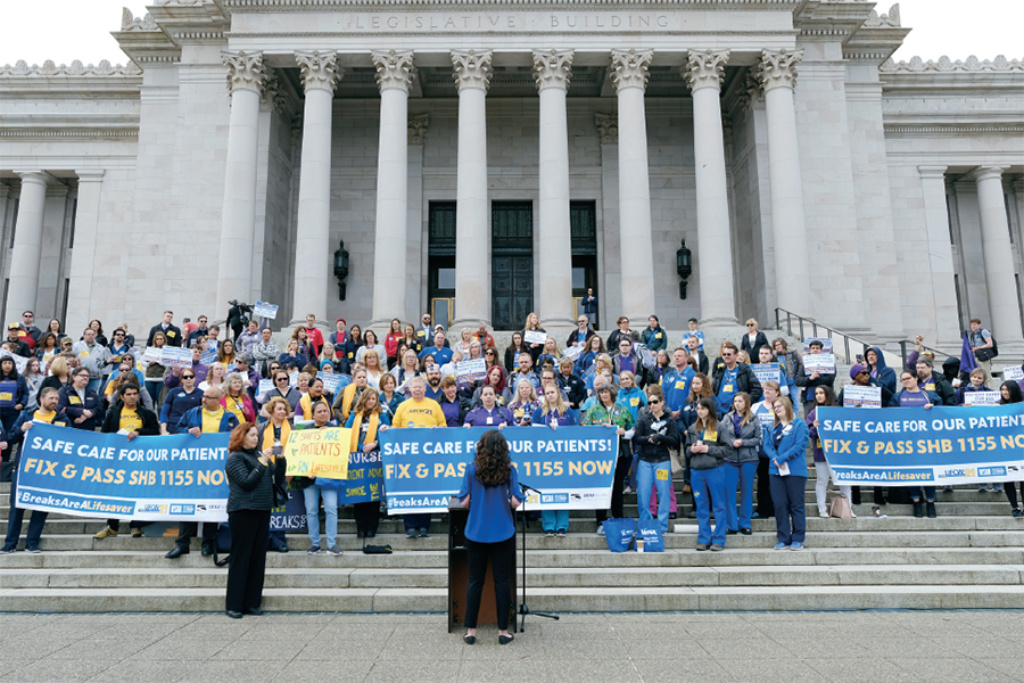Strategic priority — safe staffing
Achieving safe staffing has long been a top concern of our members and a strategic priority for WSNA’s Board of Directors. In this past biennium, WSNA won a landmark bill to protect breaks and end the abuse of mandatory overtime for nurses.
Achievements
- Won passage of the landmark Breaks and Overtime Protections bill
- Worked to improve enforcement of the 2017 Nurse Staffing Law by filing numerous complaints with the Washington State Department of Health and working with stakeholders to make recommendations in the required Dec. 31, 2020 report to the legislature.
Unprecedented member engagement drove passage of landmark legislation


This was the legislative fight that launched a thousand memes.
When our 2017-2019 Biennial Report of Achievements went to press, we were still awaiting the final outcome of our push to secure legislation to ensure breaks for nurses and end the abuse of mandatory overtime.
After a tumultuous final couple of weeks that included beating back two bad amendments, the Breaks and Overtime Protection law (SHB 1155) passed both houses of the State Legislature on April 24, 2019 and was signed into law by Governor Inslee on May 8, 2019.
This followed an intense legislative campaign, with cooperation between the three biggest unions representing health care workers in Washington state: WSNA, SEIU Healthcare 1199NW and UFCW 21. Nurses from around the state held one-on-one meetings with their elected representatives, testified in Olympia and sent thousands of emails to legislators to encourage passage of SHB 1155.
An unfortunate remark from one state senator that nurses in rural hospitals “probably play cards for a considerable amount of the day” made international news after a WSNA blog post went viral. The blog post was shared on Facebook more than 50,000 times, generating more than 176,000 comments, and spawned memes and related posts across the social universe.
The story was picked up by more than 200 news outlets located in three countries in the first seven days after the blog was posted and had more than half a million social media interactions. News outlets included CNN, Fox News, The New York Times, The Daily Mail (UK), CBS News, Mother Jones and The Hill.
WSNA and our members were able to channel that outrage into an effective online and on-the-ground advocacy campaign that put nurses and other health care workers center stage. Thousands of nurses called their legislators and even sent packs of playing cards to the senator who made that unfortunate remark.

On April 24, 2019, hundreds of nurses and other health care workers filled the Capitol steps for a rally supporting passage of a rest breaks and overtime protections bill that excluded the two bad amendments tacked on at the last minute.
That afternoon, nurses and techs crowded the Senate galleries and silently watched with bated breath as the vote count ticked up to 32-16. The House took up the bill shortly thereafter and passed it off the House floor by a vote of 70-24. Cheers broke out in the hallway outside the gallery after the bill finally passed.
The bill codifies uninterrupted breaks and says that mandatory prescheduled on-call may not be used in lieu of scheduling employees to work regularly scheduled shifts. This bill took effect for most hospitals on Jan. 1, 2020 and will go into effect for Critical Access Hospitals and sole community hospitals on July 1, 2021.
WSNA, SEIU 1199NW and UFCW 21 issued a joint statement following passage of the Breaks and Overtime Protection bill:
“After nearly a decade of work by thousands of hospital nurses, techs, patients and supporters, Washington is joining many other states, including Oregon and California, in better protecting hospital patients. By guaranteeing rest breaks to nurses and other frontline caregivers during their long shifts, and prohibiting mandatory overtime, Washington hospitals will reduce the chances for medical errors.”
WSNA shared details of the bill and implementation steps with members at a series of education events held across the state in fall 2019 and spring 2020.
WSNA works to improve enforcement of the 2017 nurse staffing law
The passage in 2017 of House Bill 1714, which added more structure and oversight to the Nurse Staffing Law, was a big victory. But, as with all legislation, it’s only as effective as it works in the field.
The bill included a requirement for the Washington State Department of Health (DOH) to submit a report to the legislature on Dec. 31, 2020. WSNA worked to ensure that the report addressed key concerns from nurses about staffing committees and hospital compliance with the law. Our experiences illustrated deficiencies in enforcement of the law, and WSNA filed 22 complaints with the DOH by the end of 2020, supported by the Staffing Concern/Assignment Despite Objection (ADO) forms our members filed to call out problems in their facilities.
The Nurse Staffing Law also required that DOH convene a stakeholder group prior to the submission of the Dec. 31, 2020 report to the legislature and named the participants of that group as WSNA, the Washington State Hospital Association, SEIU Healthcare 1199NW and UFCW 21. The group of stakeholders was able to reach agreement on two recommendations to be included in the report: 1. Nurse Staffing Committees should develop and adopt charters, defining the process they will use to review complaints and document decisions, and 2. DOH should clarify the proper agency and procedure to investigate complaints of retaliation specifically prohibited in the law.
WSNA, along with our union partners, made several additional recommendations that will be included in the report’s appendix, including a recommendation that hospitals be required to submit staffing plans to DOH annually using a standard template and making hospital-level nurse staffing committee meetings open unless in executive session.
The current Nurse Staffing Law sunsets in 2023. Over the next biennium, WSNA and the other unions that represent nurses will be working to determine recommended adjustments and next steps.



